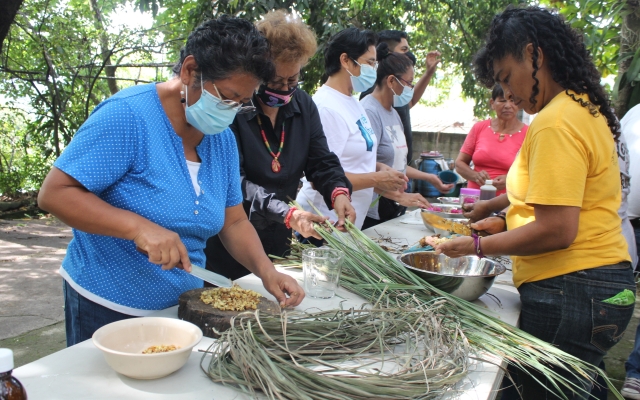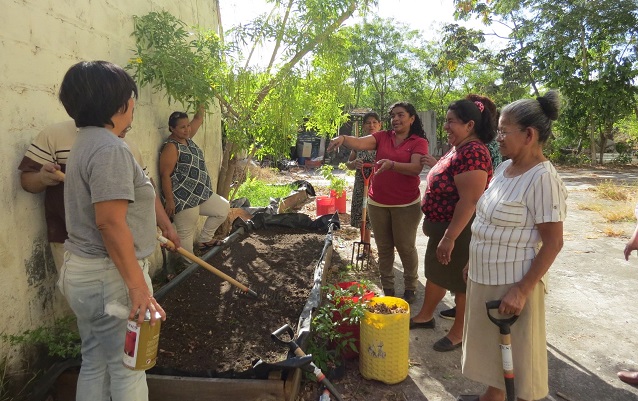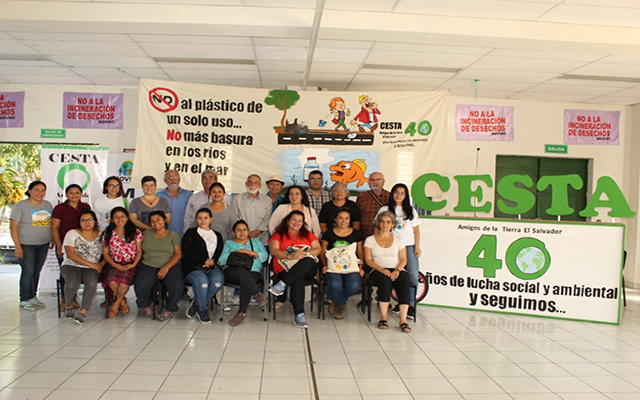Building capacities to reduce the impacts of climate change in urban areas near San Salvador

Climate change induced extreme weather like hurricanes or droughts are an increasing concern in El Salvador. Deforestation and unsustainable farming practices threaten the country’s biodiversity as well as the quality and availability of food and water. The IKI Small Grants project aims to improve the living conditions and food security of three urban communities in San Salvador and increase awareness about climate change adaptation on community level. Women-led groups are supported in producing and marketing local organic food. The project promotes an alliance between food producing groups and organisations working at the national level. By involving stakeholders from local to national levels, knowledge on effective ecosystem rehabilitation and climate change resilience is exchanged.
INITIAL SITUATION
El Salvador is increasingly affected by climate change, sometimes with severe storms and hurricanes, but mostly with extensive droughts. In addition, there are inadequate practices in forest management, solid and liquid waste processing, urban development, transportation, agricultural production and use of chemicals in industry and agriculture. As a result, the quality and availability of food and water is threatened, affecting people’s lives, particularly in vulnerable groups like women, youth and children.
The municipalities of San Marcos, Santiago Texacuangos and Santo Tomás which are surrounding the capital San Salvador suffer from these circumstances and are also characterized by a lack of land planning, poor infrastructure and a strong pressure on natural systems.
TARGET GROUP
The project targets 3 municipalities of the department of San Salvador with total a population of over 100,000 inhabitants. The main target groups include teacher unions, youth environmentalists, women’s groups, urban food producers and grassroots Christian communities.
VIDEOS FROM THE PROJECT
APPROACH AND ACTIVITIES
The project intervenes by generating awareness on the impacts of climate change and the loss of biodiversity, as well as increasing resilience to climate change.
- Teachers implement environmental projects in schools to generate and strengthen conscience and environmental behaviour of students.
- Women groups demonstrate that environmental work cannot be effective unless gender equity is incorporated at all levels. The project establishes demonstration plots for urban agriculture in the 3 target areas and develops food production experiences with members of the 25 women-led groups, learning how to make inputs using local resources, conserving seeds, and marketing surpluses, to generate conditions for sustainability. To strengthen gender equality, several meetings bring together women led groups from different sectors to make a common agenda to address environmental issues from a gender justice perspective.
- Urban agroecological gardeners help to transform agricultural practices. Compost will improve soil fertility and an increased variety of food crops will counter the erosion of agro-biodiversity.
- Youth environmental groups carry out reforestation actions to improve ecosystems, expand vegetation, improve biological connectivity, conserve species and recover water capacity.
- Christian grassroots communities will incorporate environmental actions such as educational activities, composting, plant nurseries, to achieve harmonious human coexistence.
To ensure that the benefits are maintained after the end of the project and that experiences can be replicated in other areas, the project will consolidate an organization of urban producer groups. The results will be systematized, and documents published to facilitate replicability in other areas, knowledge and experiences will be exchanged in workshops with organizations that work in food production in other municipalities.
In addition to the above and to integrate the results into the country’s policy, an alliance will be formed with MOVIAC organizations that operate at the national level, to influence the formulation of a law to promote agroecology, incorporating climate and biodiversity issues. With this, the municipalities will be given tools to invest in the reconversion of their food production systems and support and monitor the different efforts promoted by the groups in their municipalities.
LATEST PROJECT HIGHLIGHTS AND IMPACTS
- Project finalised.
- Planting of 500 fruit, medicinal, timber and honey trees
- Establishment of 8 small nurseries for 100 species of medicinal plants
- Establishment of 100 family gardens with nutritional and medicinal species
- Knowledge dissemination on climate change and agroecology among 95 women and 42 men.
CAPACITY DEVELOPMENT
IKI Small Grants supports CESTA in their organisational capacity development through:
- Sound analysis of CESTA’s professional experiences and capacities
- English language training for all staff over 18 months
- Advanced workshop on popular environmental education methodologies
- Intensive workshop on tools for working with youth and women
ABOUT THE ORGANISATION
CESTA, Amigos de la Tierra El Salvador is an environmental non-profit organisation founded in 1980 in El Salvador. Its areas of work include food sovereignty, the promotion of bicycles, zero waste, climate change and environmental rights. CESTA is part of the network Friends of the Earth International (FOEI).
PRESS AND MEDIA COVERAGE
The following video was published by Deutsche Welle, Germany’s international broadcaster. It shows a short feature on the work of CESTA in the San Salvador region. The video is available in German and English.


